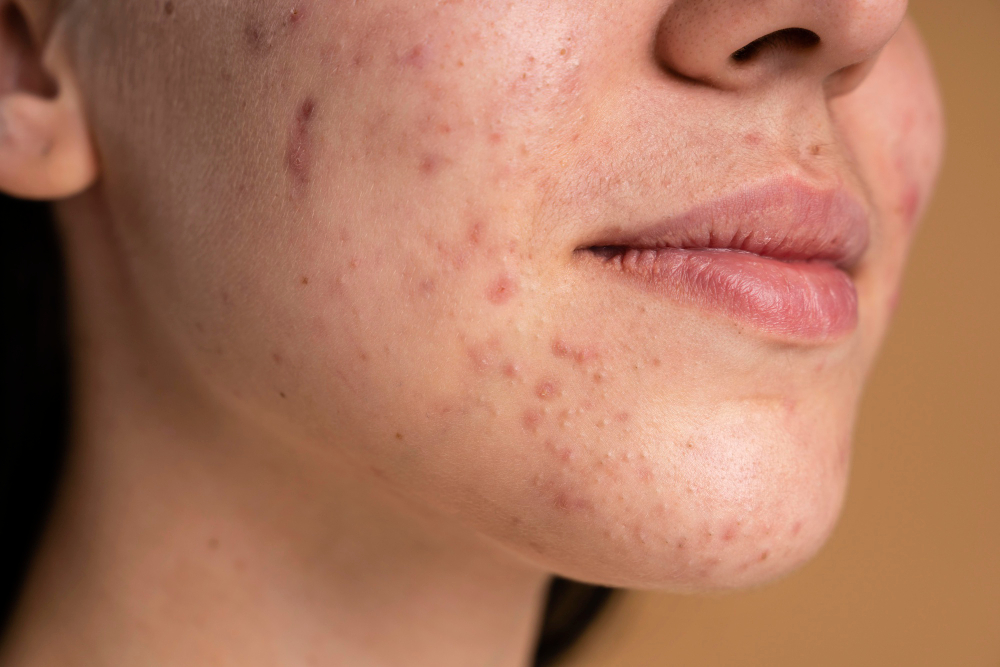Unfortunately, acne doesn’t just happen when you’re a teenager. There are many factors that can cause your skin to break out well into adulthood. If you’re wondering why you’re breaking out, read on to discover some common causes of acne and what you can do to fix them.
You’re not washing your face
This might seem like an obvious one, but it’s important. If you allow dirt and oil to build up on your face, it can clog your pores and cause breakouts. So, you should make sure you’re washing your face properly both in the morning and the evening. You should also ensure you’re washing your face after working out, to stop sweat from clogging your pores.
What you wash your face with will depend on your skin type, but a good all-rounder will be to use a gentle cleanser. This will effectively remove the excess dirt, grime and oils without stripping the skin of the natural moisture it needs. If you wear makeup, you should first ensure you’re using an effective makeup remover, and then follow with your cleanser. You can then use toner to remove any remaining grime and to tone the skin.
You’re stressed and exhausted
Being overly stressed and not sleeping can both contribute to breakouts. When you’re stressed, your body releases excess amounts of cortisol, which is a hormone that can encourage your skin to produce more oil. This results in clogged pores and acne. Not sleeping enough can also lead to your body overproducing cortisol.
There’s no quick fix to acne that’s caused by stress and lack of sleep. You should look at developing habits and behaviors to look after your mental health and wellbeing, such as therapy, meditation, and journaling. It can also be helpful to develop a good bedtime routine, to see if this can help you get a better night’s sleep.
Your hormones
Unfortunately, hormones can cause acne. These can just be everyday fluctuations throughout a menstrual cycle or can be caused by pregnancy or menopause. The fluctuations can cause excess oil to be produced by the skin, which can lead to clogged pores.
Sometimes, certain oral contraceptives can help to balance out your hormones and reduce breakouts. Otherwise, the usual acne treatments such as tea tree oil, retinoids and AHAs can help to decrease inflammation, clear pores and calm breakouts.
You’re exfoliating too much
If you have oily skin, you might be more prone to over exfoliating your face. You might think it’s required to remove the excess oils, but using too harsh a physical exfoliant too often can cause microtears in the skin. This can lead to breakouts as well as making any current acne you have worse. Similarly, a harsh chemical exfoliant can damage the skin’s barrier, which can result in breakouts.
Instead, you should look for a gentle chemical exfoliator, such as BHAs or fruit enzymes, or use an exfoliating cream that uses finely ground microparticles to gently buff away dead skin cells. You might need to reduce how often you exfoliate too – with a gentle exfoliator, you might need to exfoliate just two or three times a week.
You’re using the wrong skincare
If your skin is prone to acne, you’ll want to avoid skincare that clogs your pores and makes the problem worse. Certain moisturizers, makeup, and other skincare products can contain oils that are too heavy for acne-prone skin. Some oils, however, can be good for your skin, so you should look for non-comedogenic ingredients – this means they won’t clog your pores.
Some skincare that promises to mattify skin can also cause breakouts. This is because they contain ingredients like sulfates that strip the skin of its natural oils. To balance this, your skin will then overproduce oil, which can lead to breakouts. When looking for skincare, you should aim to balance the complexion, with lightweight moisturizing products and non-comedogenic ingredients.
Sometimes when you start using a new skincare product, your skin might react by breaking out. It’s best to try using one new product at a time, to monitor how your skin reacts so you know which product might be causing flare-ups. It’s important to note that some products, such as chemical exfoliants, might initially make flare-ups worse but they will eventually clear up breakouts. You might need to research the product to see if an initial breakout is normal, or if your skin is having a bad reaction.
Your diet
Certain foods can trigger acne and the types of food can be different for each person. Some people may break out when they consume dairy while others may see flare-ups when they eat highly-processed foods or high glycemic foods like white bread and potatoes.
If you think your diet might be causing acne, you can try keeping a journal of what you’re eating to monitor what foods could be causing it. You could also speak to a doctor in case you have a food intolerance that might require testing and treatment.

